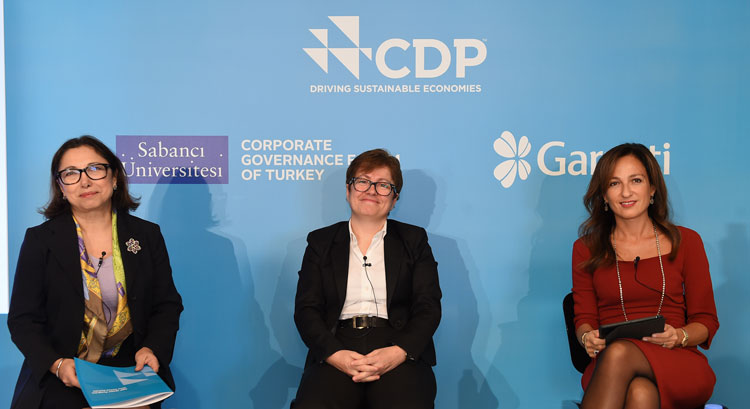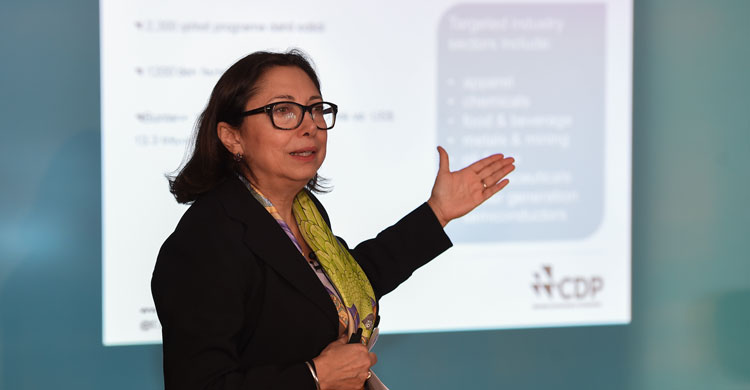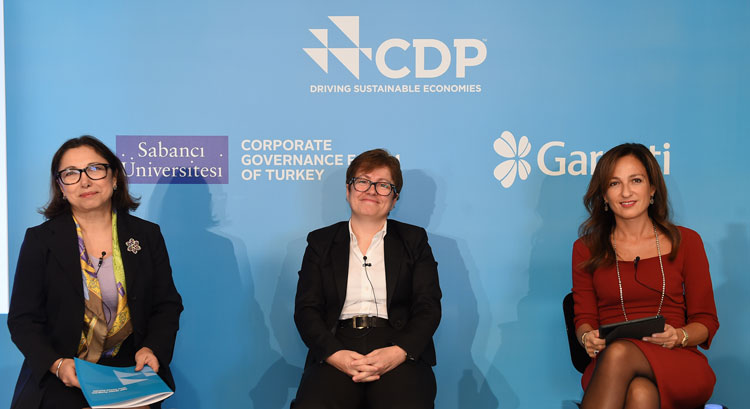08/11/2015
The CDP 2015 Global Water Report and Turkey results compiled with the support of Garanti Bank were disclosed.
The Global Water Report issued by CDP, the world's strongest and most effective environmental civil society organization, and the results achieved in Turkey were revealed at a meeting in Salt Galata on October 27, 2015.

According to CDP’s Global Water Report titled "Accelerating Action," eight companies worldwide were included in the CDP Water A List for their approach to water management. There are no Turkish companies in that list.
This was the first year that Turkish results were disclosed, and 36% of the respondents report having been exposed to water-related adverse effects in the last financial year. 64% of the companies note that water has become an important risk for their business, while 86% report that water creates opportunities for their companies.
The CDP Water Program was implemented in Turkey for the first time in 2015 by Sabancı University Corporate Governance Forum and with the support and cooperation of Garanti Bank. In addition to the outputs of the CDP 2015 Global Water Report, the CDP Turkey Water Results Report prepared with the support of Deloitte Turkey to analyze the responses of companies from Turkey was revealed to the public at the meeting in Salt Galata on Tuesday, October 27.
Introductory remarks to the main outputs of the CDP Global Water Report and the results of the CDP Water Program in Turkey were given by Sabancı University Vice President Professor Sondan Durukanoğlu Feyiz and Garanti Bank Assistant General Manager Ebru Dildar Edin. Following a video message by CDP Water Program Director Cate Lamb, Sabancı University Corporate Governance Forum Director Dr. Melsa Ararat presented the CDP Global Water Report and Turkey results.

"Calculations suggest that the business-as-usual approach will cause Turkey to be among nations that experience water shortage rather than water issues by 2030."
Sabancı University Vice President Professor Sondan Durukanoğlu Feyiz said, "Calculations suggest that the business-as-usual approach will cause Turkey to be among nations that experience water shortage rather than water issues by 2030. As individuals, public institutions and private companies, we all have responsibilities in preventing this outcome. Water is the greatest consumption input of almost all industrial sectors. I am certain that initiatives like the CDP Water Program will help to increase sensitivity to water issues in Turkey, and I know that the support of contributing companies will create awareness in business circles to create good and sustainable business models."
"Our support to the CDP Water Program aims to expand the outreach of integrated water management in Turkey and to help the private sector assume risks related to water resources."
Garanti Bank Assistant General Manager Ebru Dildar Edin said, "The CDP Global Water Report makes stark revelations about the situation of water in Turkey and indicates that if the present consumption habits were to continue and no measures were taken, water will soon become a global crisis affecting national economies, and as a result, societies. As Garanti Bank, we believe that the fundamental principle of responsible and sustainable banking is putting in thought to the consequences of any steps we take before we take them. Businesses must go beyond efficient use of water to apply precautions across their entire value chain. Therefore, our support to the CDP Water Program aims to expand the outreach of integrated water management in Turkey and to help the private sector assume risks related to water resources. We are also proud that 15 companies responded to the CDP Water Program in its first year in Turkey. We intend to increase this number year after year to join our forces for conserving water resources and preventing the devastating effects of water shortage on the society and environment."

"It has been a challenging year for water with the worsening water security and supply crisis being ranked as number one or the greatest risk facing society in terms of impact by the World Economic Forum this year."
CDP Water Program Director Cate Lamb said, "It has been a challenging year for water with the worsening water security and supply crisis being ranked as number one or the greatest risk facing society in terms of impact by the World Economic Forum this year. This year, water risk was number one; less than three years ago it wasn’t even in the top 20. I believe that is the reflection of the increasing business awareness of this issue and the necessary steps that will be required in order to secure a more stable, resilient and growing economy into the future. What was recognized in our analysis this year that despite the fact that leading companies are breaking away from the rest of the pack, there is a significant gap in performance overall. Many companies still fail to address water risks in any meaningful way. CDP provides a framework that has been used by a large number of companies to change this business-as-usual approach."
"Our reason for starting the CDP Water Program is to mediate to reveal water risks in a more comprehensive and systematic way, and establish a reputable platform for dialog on the reestablishment of water security."
Presenting CDP Water Report outputs, Sabancı University Corporate Governance Forum Director Melsa Ararat said, “Water-related risks have been gaining more and more weight among the climate change risks that companies have been reporting under the CDP Climate Change Program since 2010. It has been frequently said lately that Turkey is among high-risk countries with respect to water security. The reason for starting the CDP Water Program as part of CDP Turkey this year was to mediate to reveal water risks in a more comprehensive and systematic way, and establish a reputable platform for dialog on the reestablishment of water security."
CDP 2015 Global Water Report main outputs
CDP has the world's most comprehensive corporate dataset on water risks and opportunities compiled through water questionnaires and responses. This year 617 institutional investors asked 1,073 of the world’s largest publicly listed companies across industry sectors with high water vulnerability or impacts to disclose how they are adapting and responding to worsening water security. CDP’s new global water report analyzes the 405 company responses to this request, including those from Turkey.
CDP disclosed the results of CDP Water Ratings given to responding companies for the first time this year. Asahi Group Holdings, Colgate Palmolive, Ford Motor Company and Toyota Motor Corporation are among the global corporations achieving an A rating for their efforts to improve water security and being included in the CDP Water A List. No Turkish companies were on the A List.
Key findings of the global report:
- Acting to improve water security remains a fundamental business imperative for many companies. Corporate water stewardship is becoming better understood, particularly by large corporations. Almost two-thirds of responding companies report exposure to water risk, with reported financial impacts in 2015 totaling more than US$2.5 billion.
- Oil and gas companies showed the least transparency to investors despite high exposure to water risk. Only 22% of the world’s largest publicly listed energy companies disclosed their water management strategies.
- The eight companies in the CDP Water A List will help to drive performance in the market. Analysis of responses over five years illustrates considerable progress in water management – but also serious areas of weakness. Supply chain risks, incomplete water risk assessments, a lack of meaningful water policies, and far from universal disclosure, all need to be addressed as a matter of urgency.
- Tackling water challenges remains an issue and action is urgently needed to close the gap between large companies and others. Despite increasing investor involvement, the market is not transparent enough: Only 38% of the 1073 companies responded to CDP's disclosure request.
- Water stewardship offers clear benefits to at-risk companies. Transforming business as usual operational approaches to water management into strategic water stewardship efforts reduces risk, enhances strategic preparedness, improves investor appeal and makes businesses more resilient.
CDP Turkey 2015 Water Program Results
The CDP Water Program sent disclosure requests to 51 companies traded on the BIST-100 index that operate in sectors most vulnerable to water risks. In addition to 8 of these companies responding, 7 additional companies voluntarily disclosed data despite not being requested by CDP to do so, for a total of 15 respondents this year.
Key Findings:
- Turkish companies have a very low rate of response to CDP. 84% of the 51 companies receiving requests failed to respond to the CDP Water Program in 2015. On the other hand, 7 companies voluntarily disclosed their water data. The low rate of responses may be tied to many factors such as receiving a request from CDP for the first time, lack of an effective water policy, lack of water-related data, and the nonexistence of a national water strategy.
- 36% of the respondents report having been exposed to water-related adverse effects in the last financial year.
- Water security is a key business issue for many Turkish companies. 64% of the respondents report that water has become a significant risk for their business.
- No company in Turkey has an effective and comprehensive water policy. Such a policy requires that water-related strategies are integrated into the overalls strategies of the company, performance standards are established for direct operations and supply chains, action steps are clearly defined, and water, health and hygiene are recognized as fundamental human rights.
- Physical risk factors like increasing water shortage or stress, degrading water quality and droughts are the risks most frequently reported by respondents. Three quarters of the 35 different water-related risks reported are physical risks.
- 86% of the respondents report that water presents operational, strategic or economic opportunities. The most important opportunities are in cost savings and increased water efficiency. Many companies believe that reducing water consumption may bring cost savings.
- There are great gaps in water risk assessment. Only 14% of these companies have completed a general risk assessment that covers their direct operations and supply chains. The majority of Turkish companies are yet to define comprehensive policies that involve suppliers in their value chains in the water issue.
- 79% of the respondents report that water policies, strategies and planning, or corporate water management as a whole, is handled at the Board level.
- Half of the respondents have set targets regarding water. 79% of the companies have set qualitative targets for improving water management, while 50% have set quantitative targets.
Among key quantitative targets are "reducing the quantity of water drawn," "improving the monitoring of water usage" and "reducing water intensity." Qualitative targets include "sustainable agriculture," "customer education" and "stronger ties with the communi




